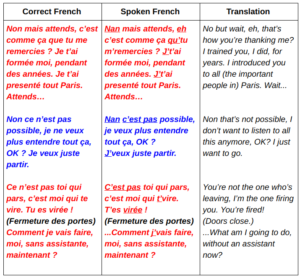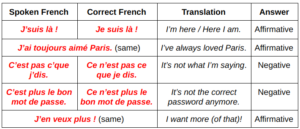Real, fast spoken French can be very hard to understand, no matter how long you’ve been studying the language! French slang, eating syllables… even dropping the “ne” in negative sentences.
One of the best ways to improve your understanding of fast spoken French is through exposure. Today, we’re going to practice your understanding with the popular Netflix show, Call My Agent.
C’est parti !
Want all the vocabulary of the lesson ?
1. Dropping the “ne” : practice with a French resource
In the video lesson above, you can watch a short clip from the French TV show Dix pour cent (= “Ten percent” literally, also called Call My Agent in the international release.)
In the clip, an agent named Andrea is angry at her assistant who’s quitting after enduring too much abuse. Can you understand what they’re saying, even in very broad strokes?
One of them is angry, the other is crying, and it makes it hard to understand what they’re saying – even if you’ve been learning French for decades!
2. Dropping the “ne” : full written transcript
Watch the video lesson first, where we watch the clip multiple times at a slower pace to understand it better.
Have you watched it?
OK. Here’s the full transcript of the subtitles:
Andrea is in red.
Her assistant is in blue.
The signs of everyday spoken French are underlined.

3. Dropping the “ne” : explaining the spoken French in the clip
In correct written French, a negative sentence often looks like this:
- [subject] + ne + [verb] + pas (like “I don’t”)
→ Je ne pense pas. = I don’t think so. - [subject] + ne + [verb] + plus (like “not anymore”)
→ Je ne nage plus. = I don’t swim anymore. - [subject] + ne + [verb] + jamais (like “I never…”)
→ Je ne cours jamais. = I never run. - [subject] + ne + [verb] + rien (like “I don’t [verb] anything.”)
→ Je ne vois rien. = I don’t see anything.
In everyday spoken French, though, French people cut everything they can — and “ne” is the first one to go!
So, in real conversation, we would instead say:
- Je pense pas. = I don’t think so.
- Je nage plus. = I don’t swim anymore.
- Je cours jamais. = I never run.
Or, like we heard in the clip:
- Ce n’est pas possible. → C’est pas possible. (= It’s impossible. / I can’t.)
- Ce n’est pas toi qui pars → C’est pas toi qui pars. = You’re not the one who’s leaving.
- Je [ne] veux plus entendre tout ça. = I don’t want to hear all that anymore.
And because “Dix pour cent” is a real resource, and not a school exercise about this specific topic, Andrea also adds other marks of real spoken French, like:
- “Eating” some letters: je veux (= I want) is pronounced “j’veux”
- Everyday slang: virer quelqu’un (= to fire someone), tu es virée ! = you’re fired!
- Informal French: Non becomes “Nan,” “Eh” as a filler word…

A very fun (but also very useless) French fact is that there used to be a different word for the negative after “ne” for each verb. Like: “Je ne vois goutte.” = I don’t see a droplet. Un pas is a step, so “Je ne marche pas.” = I don’t walk (even) a step.
But through slow simplification, pas slowly became the only word we use with ALL verbs. The main exception is rien which used to mean “a thing.” Je ne vois rien. = I don’t see (even) a thing. And that’s how, with slow simplification again, rien now means… “nothing.”
4. Dropping the “ne” : Quiz!
The problem with dropping the “ne” in spoken French is that it’s much harder to hear whether a sentence is negative or affirmative.
In the video lesson, can you hear if these real spoken French sentences are in the negative?
Answers:

Is it easier for you to understand the spoken French in the original clip now?
Practice by yourself with your own favourite French TV shows, movies, or podcasts! Just remember to stop and pay attention when you don’t understand something.
For instance:
- Plus (silent s) = “not anymore” / Plus (with “s” sound) = “more”
- Je sais is often pronounced “Chais”
- What does the expression Quand même mean?
Find more tips on everyday spoken French with these lessons:
- French Grammar: How to say “Plus”
- Understanding spoken French pronunciation (with a French Minister)
- “Quand Même” in French: Why it’s so weird.
À tout de suite.
I’ll see you in the next lesson!
And now:
→ If you enjoyed this lesson (and/or learned something new) – why not share this lesson with a francophile friend? You can talk about it afterwards! You’ll learn much more if you have social support from your friends 🙂
→ Double your Frenchness! Get my 10-day “Everyday French Crash Course” and learn more spoken French for free. Students love it! Start now and you’ll get Lesson 01 right in your inbox, straight away.
Click here to sign up for my FREE Everyday French Crash Course


C’est très drôle, tu dois apprendre tout et après c’est mieux quand t’en laisse la moitié de ça que tu as déjà appris.
Haha ! C’est très vrai !
Enjoy your day 🙂
– Arthur, writer for Comme une Française
very good
Very helpful. Now I just have to practise listening and understanding! While I’m writing, have you ever discussed the different pronunciation of debut as in être debout (to be standing) and au debut (at the beginning)? I have a problem with it. Thank you! Julia
Hi Julia!
Être debout = [duh – boo]
Le début = [day – bu] with the French “u”.
It’s not the same word, and not the same pronunciation!
We made a lesson on this topic actually:
https://www.commeunefrancaise.com/blog/how-to-pronounce-u-ou-french
Check it out 🙂 Have a wonderful day,
– Arthur, writer for Comme une Française
Outstanding video!
J’ai dit a ma femme apres avoir regarde Call My Agent, I know two words in French: Cool et Super.
Ça c’est drôle 🤩
J’ai vu Call My Agent avec les sous titres en francais sans succes. Les acteurs parlent drolement vite pour mon oreille, et je n’ai en entendu rien, sauf que “pas de tout” ou “oui”. Mais, a mon age de 74 j’ai le meme problem quand j’en regarde en anglais. Merci pour vos videos. Tres chouette.
Merci beaucoup Géraldine. La leçon est très intéressante. J’adore Dix Pour Cent. Je comprend pas Arlette aussi.
Moi aussi ! Je ne comprends pas du tout Arlette.
C’est (ne) pas possible télécharger le pdf: Selon wordpress Il y a un ‘erreur’.
Bonjour Le Baron !
Ça fonctionne pour moi.
Voici le lien direct :
https://www.commeunefrancaise.com/wp-content/uploads/pdf/spoken-french-call-my-agent.pdf
Bonne journée,
– Arthur, writer for Comme une Française
Merci bien Arthur ! Ça m’aide beaucoup.
Bonjour Géraldine j’aime cet leçon c’est très utile
Bonne journée
Anne
Bonjour
Bien que, je suis encore en difficulté avec «Insider French » cette leçon était très aidante à moi.
Je vous la remercie !
Alors, revenons à Insider French pour moi.
This is really great C’est super
I really like watching «Dix pour cent». I have found it challenging to learn French from it, but I have also found that the more I watch it, the more I understand. The French subtitles help, since they do talk fast (especially when the characters are emotional), and they eat their syllables. Unfortunately, sometimes the subtitles only paraphrase the French or even leave things out entirely. The English subtitles tend to be more complete in this regard. The characters use slang and some verlan from time to time, and they even coin their own words, like the verb “bardotter” (season 1, episode 3).
J’adore Camille Cottin. J’ai regardé même ses sketches comiques sur YouTube.
I love that you made a video of “Dix Percent”!! I *loved* that show!
I don’t think that bit was the most difficult to understand in the show, though! Other bits are definitly impossible without subtitles… For me, the trick to “detecting” a negative phrase is PAS… (plus, jamais, rien, etc) wich is usually there and easy to catch 😉
Ben, je n’avais aucune illusion de comprendre relativement bien le francais parlé. Votre méthode est assez efficace, Géraldine. “Repetitio est mater studiorum.” Merci et bonne soirée.
Merci! Numero 3 est plutot difficile… “C’est pas c’que j’dis”, c’est très semblable que “C’est parce que je le dis”, n’est ce pas?
Bonjour Adrien !
C’est vrai, c’est très proche !
“C’est parce que je le dis” se prononcerait “C’est paskeu j’le dis”, on pourrait entendre “le” – mais c’est subtil.
(Encore plus subtil : dans “C’est pas c’que j’dis,” on appuie un peu plus sur le “pas”, alors que dans “C’est parce que j’dis” on appuie un peu plus sur le “dis.”)
Ça dépend du contexte 🙂
Très bonne journée,
– Arthur, writer for Comme une Française
Je viens de regarder une vidéo de Karine Dubernet avec le passeport vaccinal et la ré-ouverture des restaurants comme sketch. Sidérant! C’est à mourir de rire. Mais, franchement, qui savait qu’il était raisonnable de parler si vite!
Merci pour le mot sidérant; il complétement nouveau pour moi.